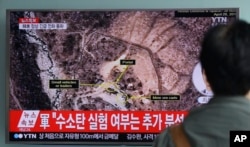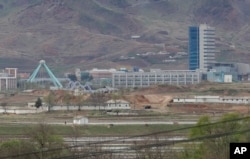North Korea's announcement that it will suspend nuclear weapon and missile tests continues to generate skepticism mixed with optimism from analysts evaluating Kim Jong Un’s commitment to denuclearize.
“We no longer need any nuclear test or test launches of intermediate and intercontinental range ballistic missiles, and because of this the northern nuclear test site has finished its mission,” Kim said through the official Korean Central News Agency, referring to the Punggye-ri nuclear test site where North Korea has conducted six nuclear tests.
The announcement came Friday as North Korea and South Korea prepared for a summit scheduled to be held a week later in the border village of Panmunjom and after Mike Pompeo, a nominee for the secretary of state, met North Korea’s Kim ahead of an as yet unscheduled summit with President Donald Trump’s summit expected to be held in late May or early June.
Although Trump tweeted on Friday, “This is very good news for North Korea and the World big progress! Look forward to our Summit,” analysts are warning that North Korea’s announcement does not signal complete North Korean denuclearization as envisioned by the U.S. as Pyongyang and Washington define the term differently. At the same time, however, analysts are welcoming Kim’s announcement as the first step of an overall denuclearization process, one which may create a positive mood for the summits.
Important step but ...
“It’s a positive step forward, but we shouldn’t read too much (into) it. I think it’s an important step in improving atmosphere for the negotiations,” said Olli Heinonen, a former deputy director-general for safeguards at the International Atomic Energy Agency.
“But at the same time, we have to keep in our mind that those tests can start again very quickly,” he added. Kim “is not going to dismantle anything as far as I can see from those statement. But it’s a good step forward.”
Christopher Hill, who negotiated with North Korea as the head of the U.S. delegation during the George W. Bush administration, warned against what appears to be a seemingly positive development.
“I think it’s important to react with some caution. I think it seems positive, but I think we should be a little cautious,” said Hill.
He said it’s important not to be carried away by the announcement since there are still a lot of work to be done on the road to denuclearization. If Kim is serious about denuclearization and if there is going to be a denuclearization agreement coming out of his anticipated summit with Trump, he needs to take further steps to declare North Korea’s nuclear sites, agree on a verification procedure, and ultimately, allow nuclear materials to be taken out of the country, said Hill.
Test site troubles?
The North’s announcement to shut down the major nuclear test site, Hill said, also should not be taken with too much enthusiasm.
“There's been a great deal of concern among experts that Punggye-ri nuclear test site was already kind of showing its age in the sixth nuclear test, and there was a lot of concern that the so-called dome in the site was collapsing,” he said.
Ken Gause, an expert on North Korea and director at the Center for Naval Analysis, sees Kim’s announcement as a favorable development that will “create a positive atmosphere for the summits.” But he said it is still too early to tell if the announcement signals North Korea’s long-term commitment toward denuclearization.
“The devil is in the details,” said Gause. “The freeze on testing was expected. The question is — how long will the freeze last and is it conditional on successful summits with (South Korea) and the U.S.?”
“Does North Korea envision a dismantlement process of its nuclear program to follow a freeze and in what time frame? We don’t know yet,” he added.
'Expressing a lot of willingness'
David Albright, a former U.N. nuclear inspector and nuclear proliferation analyst at the Institute for Science and International Security, views North Korea’s move to halt nuclear weapon and missile testing as a positive development prior to the summits.
“I think he’s making concessions that are important,” Albright said of Kim. “It is a pre-summit dance that he’s engaged in. I see it as a hopeful sign. I definitely see it as progress.”
Albright thinks Kim is “expressing a lot of willingness” and his decision to halt the testing might indicate he may even allow inspections to be done on test sites, unlike in 2008 when North Korea was unwilling to consider the U.S. access.
“So here, you have North Korea opening the door that there will be some transparency around the discontinuance of nuclear tests,” said Albright. “It opens the door to what’s been a very thorny question of access.”
In his Friday announcement, Kim also said North Korea will not transfer nuclear technology unless it is threatened.
Albright said this move is an important step for negotiations on denuclearization.
“I don’t think you can have a negotiation with the United States if North Korea does not commit not to proliferate,” said Albright. “And he’s put this on the table.”
After welcoming Kim’s announcement with enthusiasm on Friday, Trump tempered his optimism in a Sunday tweet, saying “We are a long way from conclusion on North Korea, maybe things will work out, and maybe they won’t only time will tell.”
No surprise, says White House
A White House official told VOA’s Korean Service via email on Monday that North Korea’s announcement was not a surprise as it was in line with what Trump expected from Kim.
“North Korea’s suspension of nuclear and missile tests is welcome news, and it's also consistent with North Korea’s previous promise to the U.S. in March,” said the official who asked to remain unnamed due to the sensitivity of the subject. “The president looks forward to the summit, and a comprehensive, whole-of-government effort to prepare for that is under way.”
The comments by the official suggest the announcement was a part of negotiations that may have been made earlier with the North and that a much bigger pledge from Kim may come later at the Trump-Kim summit.
Trump said on Tuesday Kim has been “very open” and “very honorable” so far, adding that the administration has been told directly that the North would like to have the summit “as soon as possible.”
At the Friday summit, leaders from South Korea and North Korea will meet for the first time in more than a decade. Last Friday, Seoul and Pyongyang set up a hotline that will enable the leaders of both countries to communicate directly by phone.


